By JULIE MINDA
Michelle Feller concedes that people who are accustomed to how things are usually done in memory care facilities may find the approaches used in the newest unit at ArchCare at Ferncliff Nursing Home and Rehabilitation Center to be rather unorthodox.
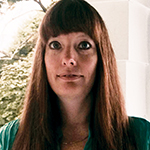
With some guidance, residents of the Center for Advanced Memory Care that Ferncliff opened in January 2022 plan their own recreation calendar, prepare the dining room for mealtimes, maintain Ferncliff gardens and greet visitors, among countless other activities, says Feller. She is assistant administrator of the Rhinebeck, New York, nursing home that is part of the New York City-based ArchCare. ArchCare is the health care ministry of the Archdiocese of New York.
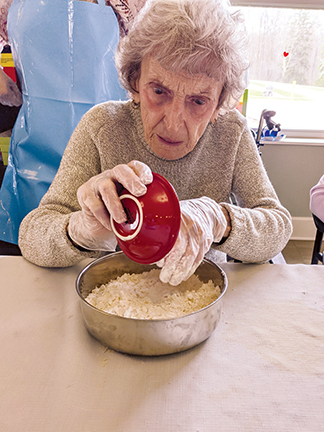
She says the Montessori learning and development principles employed in the memory care unit give greater independence and control to 37 residents, all of whom have mild to moderate dementia.
Dr. Maria Montessori, one of Italy's first female doctors, in the early 1900s pioneered the student-led, self-paced but guided educational approach that bears her name. There are about 5,000 Montessori schools educating over 1 million children from infancy through adolescence in the U.S., and thousands more Montessori schools worldwide, according to the American Montessori Society.
Ferncliff and Jennings, another Catholic continuum of care organization, are finding that applying Montessori principles in memory care facilities has boosted resident engagement, and produces positive clinical outcomes and a strong sense of community among residents.
Intuition
Ferncliff and Jennings both work with the Center for Applied Research in Dementia to apply core Montessori principles in the care of residents with dementia. The private, for-profit company based in Solon,
Ohio, says that since its launch in 2011, it has helped eldercare organizations in 25 states and in Asia, Australia and Europe incorporate Montessori principles in patient care.
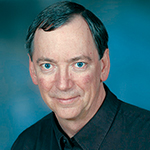
Cameron Camp co-founded the company and directs research and development there. In graduate school in the late 1970s, earning a doctorate in psychology, he studied cognition and aging. In the 1980s, he was on the faculty of the psychology department of the University of New Orleans, working in a doctoral program in applied developmental psychology. In connection with that position, he worked at an adult day center in Kenner, Louisiana, that exclusively served clients with dementia. His work there included research activity and training students on working with people with dementia.
Around the same time, Camp and his wife sent their two youngest children to a Montessori school. The couple's son attended from age 3 to 10, and their daughter from age 3 to 8.
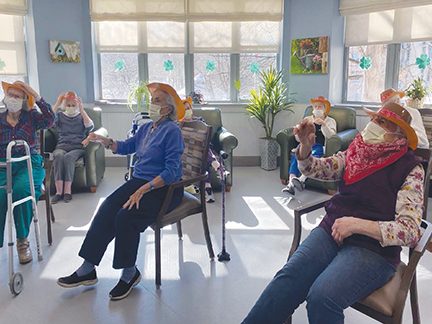
At one point Camp taught child development at the university level. Camp would later write that his wife became a Montessori preschool teacher, and he taught child development at a Montessori training center. He began to see how Montessori practices and principles might align with neuroscientific concepts related to beneficial care for people with dementia. Since the 1990s he has been developing and testing practical applications of Montessori principles in the care of people with dementia. And, for more than a decade he and other members of the center's staff have trained staff of memory care facilities to use those applications.
The center's standard programming includes an eight-hour, in-person didactic training session for facilities' staff then monthly in-person brush-up sessions and ongoing remote support for them. Organizations pay roughly $20,000 for 18 months of this type of programming.
Researchers in residence
Allison Q. Salopeck is president and chief executive of Jennings, which has four campuses in Northeast Ohio. She met Camp during an internship when she was a graduate student — he was
conducting a research project on reducing the use of restraints in nursing homes, and she was completing her thesis on the same concept — and the two shared information.
In about 2004 when Salopeck was chief operating officer of Jennings, she gave the OK for a Jennings campus in Garfield Heights to take part in one of Camp's research projects, which involved residents using a Montessori activity cart. The cart contained materials for various activities the residents could choose to do to improve their physical or mental dexterity. For instance, there was a tub filled with beans and coins — residents could separate the beans from the coins, classify the coins by type and/or count the change.
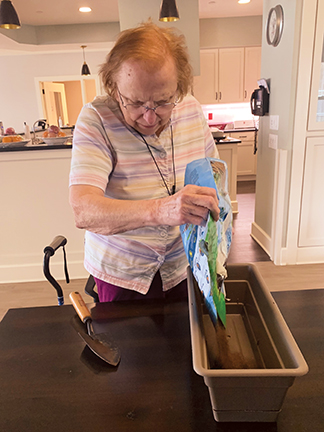
Around 2018, Jennings opened its Jennings at Notre Dame Village campus in Chardon, Ohio, which includes assisted living with memory support in a small house environment. Salopeck accepted Camp's invitation for Jennings and the Center for Applied Research in Dementia to partner to use Montessori concepts in the small houses.
The relationship has evolved — Jennings provides office space for center researchers at its Garfield Heights campus, Jennings' largest campus. In exchange those researchers provide dementia training, consultation and support for staff of Jennings campuses, particularly staffers working in the small houses for residents with dementia.
Joy and purpose
Vivian Springer, executive director of Jennings at Notre Dame Village, says the researchers' ongoing training and consultation for staff emphasizes that residents can and should do as much for themselves
as possible. "What you do for me, you take from me" is a Montessori credo.
Springer says, "Whether planning life enrichment activities or the menu, residents are very much driving these decisions. Residents are very active in participating in their household." For example, she said, some residents do their own laundry, help one another, garden and perform household duties around meals.
Staff demonstrate in small steps how to complete a given task. Springer says the approach is "giving residents purpose to their day and the sense of accomplishment for themselves, leading to improved or continued self-esteem, pride and dignity. And joy — the sense of doing something they want to do and can do well.
"We really shouldn't underestimate the importance of this feeling."
Concerts, dog treats, art awards
At Ferncliff, Feller says the residents' dining committee is responsible for setting and clearing tables and filling water cups. Hydration committee members choose and prepare fresh
fruit. Welcoming committee members meet and greet new residents. Gardening committee members plant seeds and tend to the flowers and vegetables.

Residents enthusiastically participate in programs they shape, Feller says. This includes music therapy, art therapy, daily exercise sessions, special events and charitable giving.
Last year residents baked dog biscuits for the Ulster County Society for the Prevention of Cruelty to Animals. And two residents won awards for artwork they submitted to a Leading Age New York contest.
There is a waiting list for entry to Ferncliff's memory unit. And, the Montessori approach has been so successful there that ArchCare is planning to implement it at at least one of its five other nursing homes.
Building community
Research that Camp and co-investigators published in 2016 found that Montessori-based dementia training of staff at 16 facilities resulted in use of fewer drugs including antipsychotics, antianxiety medications and antidepressants with residents. After staff
training, researchers found there were fewer reactive behaviors among residents and an improvement in employee retention.
Springer says the use of the Montessori concepts in the small house environment at Jennings at Notre Dame Village has improved the overall physical status of residents. For instance, residents generally have not had the unhealthy weight loss or extensive physical decline that is often seen in memory care.
While Feller says the Ferncliff memory care unit's use of the Montessori approach is so new that leaders have not yet been able to document outcomes, she likes what she sees. "It has surprised me how well residents have come together as a community. They care about each other."
» Listen to the Health Calls podcast on Montessori principles in memory care
